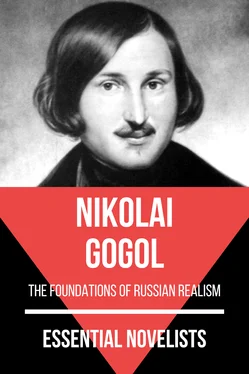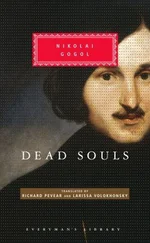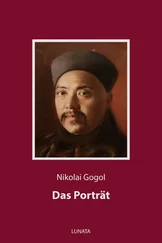“Kindly tell me which of you is Monsieur Nozdrev?” said the unknown with a glance of perplexity both at the person named (who was still standing with pipe-shank upraised) and at Chichikov (who was just beginning to recover from his unpleasant predicament).
“Kindly tell ME whom I have the honour of addressing?” retorted Nozdrev as he approached the official.
“I am the Superintendent of Rural Police.”
“And what do you want?”
“I have come to fulfil a commission imposed upon me. That is to say, I have come to place you under arrest until your case shall have been decided.”
“Rubbish! What case, pray?”
“The case in which you involved yourself when, in a drunken condition, and through the instrumentality of a walking-stick, you offered grave offence to the person of Landowner Maksimov.”
“You lie! To your face I tell you that never in my life have I set eyes upon Landowner Maksimov.”
“Good sir, allow me to represent to you that I am a Government officer. Speeches like that you may address to your servants, but not to me.”
At this point Chichikov, without waiting for Nozdrev’s reply, seized his cap, slipped behind the Superintendent’s back, rushed out on to the verandah, sprang into his britchka, and ordered Selifan to drive like the wind.
––––––––
CERTAINLY CHICHIKOV was a thorough coward, for, although the britchka pursued its headlong course until Nozdrev’s establishment had disappeared behind hillocks and hedgerows, our hero continued to glance nervously behind him, as though every moment expecting to see a stern chase begin. His breath came with difficulty, and when he tried his heart with his hands he could feel it fluttering like a quail caught in a net.
“What a sweat the fellow has thrown me into!” he thought to himself, while many a dire and forceful aspiration passed through his mind. Indeed, the expressions to which he gave vent were most inelegant in their nature. But what was to be done next? He was a Russian and thoroughly aroused. The affair had been no joke. “But for the Superintendent,” he reflected, “I might never again have looked upon God’s daylight—I might have vanished like a bubble on a pool, and left neither trace nor posterity nor property nor an honourable name for my future offspring to inherit!” (it seemed that our hero was particularly anxious with regard to his possible issue).
“What a scurvy barin!” mused Selifan as he drove along. “Never have I seen such a barin. I should like to spit in his face. ‘Tis better to allow a man nothing to eat than to refuse to feed a horse properly. A horse needs his oats—they are his proper fare. Even if you make a man procure a meal at his own expense, don’t deny a horse his oats, for he ought always to have them.”
An equally poor opinion of Nozdrev seemed to be cherished also by the steeds, for not only were the bay and the Assessor clearly out of spirits, but even the skewbald was wearing a dejected air. True, at home the skewbald got none but the poorer sorts of oats to eat, and Selifan never filled his trough without having first called him a villain; but at least they WERE oats, and not hay—they were stuff which could be chewed with a certain amount of relish. Also, there was the fact that at intervals he could intrude his long nose into his companions’ troughs (especially when Selifan happened to be absent from the stable) and ascertain what THEIR provender was like. But at Nozdrev’s there had been nothing but hay! That was not right. All three horses felt greatly discontented.
But presently the malcontents had their reflections cut short in a very rude and unexpected manner. That is to say, they were brought back to practicalities by coming into violent collision with a six-horsed vehicle, while upon their heads descended both a babel of cries from the ladies inside and a storm of curses and abuse from the coachman. “Ah, you damned fool!” he vociferated. “I shouted to you loud enough! Draw out, you old raven, and keep to the right! Are you drunk?” Selifan himself felt conscious that he had been careless, but since a Russian does not care to admit a fault in the presence of strangers, he retorted with dignity: “Why have you run into US? Did you leave your eyes behind you at the last tavern that you stopped at?” With that he started to back the britchka, in the hope that it might get clear of the other’s harness; but this would not do, for the pair were too hopelessly intertwined. Meanwhile the skewbald snuffed curiously at his new acquaintances as they stood planted on either side of him; while the ladies in the vehicle regarded the scene with an expression of terror. One of them was an old woman, and the other a damsel of about sixteen. A mass of golden hair fell daintily from a small head, and the oval of her comely face was as shapely as an egg, and white with the transparent whiteness seen when the hands of a housewife hold a new-laid egg to the light to let the sun’s rays filter through its shell. The same tint marked the maiden’s ears where they glowed in the sunshine, and, in short, what with the tears in her wide-open, arresting eyes, she presented so attractive a picture that our hero bestowed upon it more than a passing glance before he turned his attention to the hubbub which was being raised among the horses and the coachmen.
“Back out, you rook of Nizhni Novgorod!” the strangers’ coachman shouted. Selifan tightened his reins, and the other driver did the same. The horses stepped back a little, and then came together again—this time getting a leg or two over the traces. In fact, so pleased did the skewbald seem with his new friends that he refused to stir from the melee into which an unforeseen chance had plunged him. Laying his muzzle lovingly upon the neck of one of his recently-acquired acquaintances, he seemed to be whispering something in that acquaintance’s ear—and whispering pretty nonsense, too, to judge from the way in which that confidant kept shaking his ears.
At length peasants from a village which happened to be near the scene of the accident tackled the mess; and since a spectacle of that kind is to the Russian muzhik what a newspaper or a club-meeting is to the German, the vehicles soon became the centre of a crowd, and the village denuded even of its old women and children. The traces were disentangled, and a few slaps on the nose forced the skewbald to draw back a little; after which the teams were straightened out and separated. Nevertheless, either sheer obstinacy or vexation at being parted from their new friends caused the strange team absolutely to refuse to move a leg. Their driver laid the whip about them, but still they stood as though rooted to the spot. At length the participatory efforts of the peasants rose to an unprecedented degree of enthusiasm, and they shouted in an intermittent chorus the advice, “Do you, Andrusha, take the head of the trace horse on the right, while Uncle Mitai mounts the shaft horse. Get up, Uncle Mitai.” Upon that the lean, long, and red-bearded Uncle Mitai mounted the shaft horse; in which position he looked like a village steeple or the winder which is used to raise water from wells. The coachman whipped up his steeds afresh, but nothing came of it, and Uncle Mitai had proved useless. “Hold on, hold on!” shouted the peasants again. “Do you, Uncle Mitai, mount the trace horse, while Uncle Minai mounts the shaft horse.” Whereupon Uncle Minai—a peasant with a pair of broad shoulders, a beard as black as charcoal, and a belly like the huge samovar in which sbiten is brewed for all attending a local market—hastened to seat himself upon the shaft horse, which almost sank to the ground beneath his weight. “NOW they will go all right!” the muzhiks exclaimed. “Lay it on hot, lay it on hot! Give that sorrel horse the whip, and make him squirm like a koramora [22].” Nevertheless, the affair in no way progressed; wherefore, seeing that flogging was of no use, Uncles Mitai and Minai BOTH mounted the sorrel, while Andrusha seated himself upon the trace horse. Then the coachman himself lost patience, and sent the two Uncles about their business—and not before it was time, seeing that the horses were steaming in a way that made it clear that, unless they were first winded, they would never reach the next posthouse. So they were given a moment’s rest. That done, they moved off of their own accord!
Читать дальше












